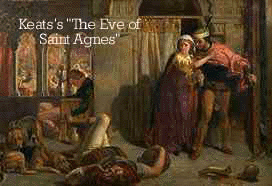John Keats

 |
Alone and palely loitering; The sedge is wither'd from the lake, And no birds sing.
Ah, what can ail thee, wretched wight,
I see a lily on thy brow,
I met a lady in the meads
I set her on my pacing steed,
I made a garland for her head,
She found me roots of relish sweet,
She took me to her elfin grot,
And there we slumber'd on the moss,
I saw pale kings, and princes too,
I saw their starv'd lips in the gloam
And this is why I sojourn here |
1. What does the speaker ask of the knight-at-arms in the first two stanzas? How does the time of year reflect the knight's physical and emotional state? 2. Summarize the story the knight tells in reply. What do the knight's words reveal about him? 3. How do you interpret the knight's dream? In your opinion, why does the knight stay "on the cold hill's side'? Use details from the poem to support your ideas. Evaluate and Connect |
Before my pen has glean'd my teeming brain, Before high piled books, in charact'ry, Hold like rich garners the full-ripen'd grain; When I behold, upon the night's starr'd face, Huge cloudy symbols of a high romance, And think that I may never live to trace Their shadows, with the magic hand of chance; And when I feel, fair creature of an hour! That I shall never look upon thee more, Never have relish in the faery power Of unreflecting love!--then on the shore Of the wide world I stand alone, and think Till Love and Fame to nothingness do sink. |
1. Summarize the speaker's main fears. What do these fears reveal about the speaker's values and goals? 2. Explain the agricultural metaphors and similes found in lines 1-4 (see pages R14 and R9). What do the comparisons reveal? 3. What happens to the speaker's fears? What tone is established in the last two lines? Evaluate and Connect |
Thou foster-child of silence and slow time, Sylvan historian, who canst thus express A flowery tale more sweetly than our rhyme: What leaf-fring'd legend haunts about thy shape Of deities or mortals, or of both, In Tempe or the dales of Arcady? What men or gods are these? What maidens loth? What mad pursuit? What struggle to escape? What pipes and timbrels? What wild ecstasy?
Heard melodies are sweet, but those unheard
Ah, happy, happy boughs! that cannot shed
Who are these coming to the sacrifice?
O Attic shape! Fair attitude! with brede |
1. What metaphors (see page R9) does the speaker use to describe the urn in lines 1-3? What do the metaphors reveal about the speaker's view of the urn? 2. Why might an "unheard melody" be sweeter than a heard melody (see lines 11-12)? 3. What people and things does the speaker address in the second and third stanzas? Why does the speaker envy them? Cite evidence from the poem. 4. Theme Connections: What message does the poem give about truth and beauty? Evaluate and Connect |
Close bosom-friend of the maturing sun; Conspiring with him how to load and bless With fruit the vines that round the thatch-eves run; To bend with apples the moss'd cottage-trees, And fill all fruit with ripeness to the core; To swell the gourd, and plump the hazel shells With a sweet kernel; to set budding more, And still more, later flowers for the bees, Until they think warm days will never cease, For Summer has o'er-brimm'd their clammy cells.
Who hath not seen thee oft amid thy store?
Where are the songs of Spring? Ay, where are they? |
1. Name four things from stanza 1 that autumn and the sun conspire to do. What are the "clammy cells" summer has "o'er-brimmed" and with what has it "o'er-brimmed" them? 2. Describe the personified images of autumn in the second stanza (see page Rll).ln what ways do these differ from those in the first stanza? 3. According to the speaker, who sings the songs of autumn? 4. At what time of day do the creatures sing? Why might this be an appropriate time for autumn's music? Evaluate and Connect |
My sense, as though of hemlock I had drunk, Or emptied some dull opiate to the drains One minute past, and Lethe-wards had sunk: 'Tis not through envy of thy happy lot, But being too happy in thine happiness,-- That thou, light-winged Dryad of the trees, In some melodious plot Of beechen green, and shadows numberless, Singest of summer in full-throated ease.
O, for a draught of vintage! that hath been
Fade far away, dissolve, and quite forget
Away! away! for I will fly to thee,
I cannot see what flowers are at my feet,
Darkling I listen; and, for many a time
Thou wast not born for death, immortal Bird!
Forlorn! the very word is like a bell |
2) What wish does the speaker express at the end of stanza II and at the beginning of stanza III? According to stanza IV, how will he accomplish this wish? 3) What effect does the word "forlorn" have on the speaker in stanza VIll? 4) What is the "draught of vintage" the speaker craves in stanza II? What would it help him to escape? 5) What differences between the speaker's world and the bird's are described in stanza IV? What is meant in line 38 by "here there is no light"? 6) What does the speaker find tempting in stanza VI? What changes his mind in stanza VII? |